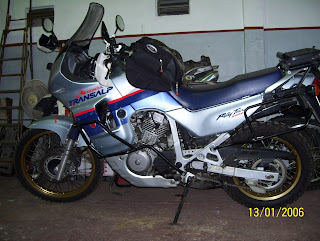

are they having a relationship?
SATURDAY: SEPTEMBER 30
Javier and Sandra have an assado for bikers on Saturdays. I take the Metro and the train out to Florida. An East German is the only other foreigner. He is a computer engineer (mamoth computers), works as a consultant for a couple of years, then does a runner for a year, wandering Latin America on a big bike. Back home his friends think him crazy: all that money he could be earning and hoarding in the bank. Ming would understand; he is about to do another runner. So would the Polish software expert I met last year in Porto Bello, Panama. The Pole was director of a software company in Boston, Mas. He gave lunch to a client in a restaurant over looking a marina and spotted a FOR SALE sign on a small sailboat. He walked down to the marina after lunch, bought the sailboat and never went back to the office.
What do these men have in common?
High earning capacity and discovery that money isn't a sufficient goal. Nor is it a satisfactory foundation for society. There has to be more. The East German talks of social morality. Why is shooting people a greater crime than being responsibile for people starving?
I listen and nod my agreement, drink red wine and eat meat...
Javier and Sandra have an assado for bikers on Saturdays. I take the Metro and the train out to Florida. An East German is the only other foreigner. He is a computer engineer (mamoth computers), works as a consultant for a couple of years, then does a runner for a year, wandering Latin America on a big bike. Back home his friends think him crazy: all that money he could be earning and hoarding in the bank. Ming would understand; he is about to do another runner. So would the Polish software expert I met last year in Porto Bello, Panama. The Pole was director of a software company in Boston, Mas. He gave lunch to a client in a restaurant over looking a marina and spotted a FOR SALE sign on a small sailboat. He walked down to the marina after lunch, bought the sailboat and never went back to the office.
What do these men have in common?
High earning capacity and discovery that money isn't a sufficient goal. Nor is it a satisfactory foundation for society. There has to be more. The East German talks of social morality. Why is shooting people a greater crime than being responsibile for people starving?
I listen and nod my agreement, drink red wine and eat meat...